According to a new report, Greenland and Antarctica are losing ice six times faster than in the 1990s – currently on track with the Intergovernmental Panel on Climate Change’s worst-case climate warming scenario.
The findings, published in two separate papers in Nature, show that Greenland and Antarctica lost 6.4 trillion tonnes of ice between 1992 and 2017 – pushing global sea levels up by 17.8 millimeters.
Of the total sea level rise coming from melting polar ice sheets, around 60% (10.6 millimeters) was due to Greenland ice losses and 40% was due to Antarctica (7.2 millimeters).
The combined rate of ice loss has risen by a factor of six in just three decades, up from 81 billion tonnes per year in the 1990s to 475 billion tonnes per year in the 2010s. This means that polar ice sheets are now responsible for a third of all sea level rise.
The new assessment comes from an international team of 89 polar scientists who have produced the most complete picture of ice loss to date.
The Ice Sheet Mass Balance Inter-comparison Exercise (IMBIE), led by Andrew Shepherd from the University of Leeds and Erik Ivins at NASA’s Jet Propulsion Laboratory, compared and combined data from 11 satellites – including ESA’s ERS-1, ERS-2, Envisat and CryoSat missions, as well as the EU’s Copernicus Sentinel-1 and Sentinel-2 missions – to monitor changes in the ice sheet’s volume, flow and gravity.
Using observation data spanning three decades, the team has produced a single estimate of Greenland and Antarctica’s net gain or loss of ice – known as mass balance.
Prof. Shepherd explains, “Every centimeter of sea level rise leads to coastal flooding and coastal erosion, disrupting people’s lives around the planet.
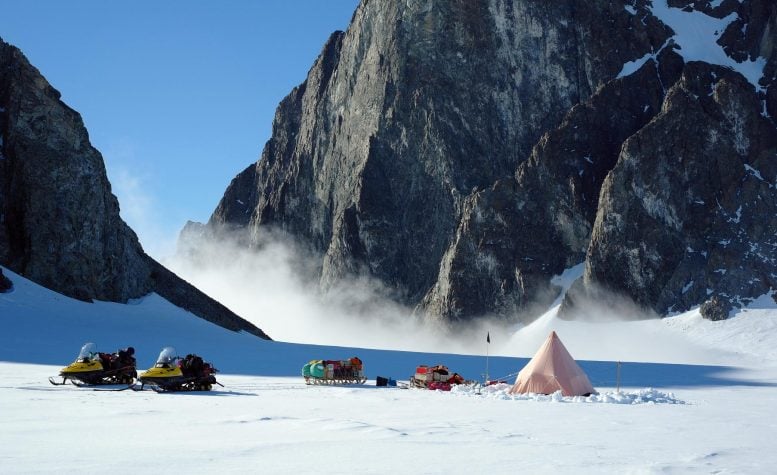
A British Antarctic Survey two-man field camp next to The Obelisk on Alexander Island, Antarctic Peninsula. Credit: Hamish Pritchard, BAS
“If Antarctica and Greenland continue to track the worst-case climate warming scenario, they will cause an extra 17 centimeters of sea level rise by the end of the century. This would mean 400 million people are at risk at annual coastal flooding by 2100. These are not unlikely events with small impacts; they are already underway and will be devastating for coastal communities.”
ESA’s Director of Earth Observation Programmes, Josef Aschbacher, comments, “The findings reported by IMBIE demonstrate the fundamental importance of using satellite data to monitor the evolution of ice sheets.
“IMBIE is also a prime example of how the best science teams in Europe and the US have worked in an exemplary way together to address some burning questions of science.”
The Intergovernmental Panel on Climate Change (IPCC)’s latest report predicted that global sea levels will rise by 60 centimeters by 2100, and it is estimated that this would put 360 million people at risk of annual coastal flooding.
However, the IMBIE team’s studies show that ice losses from Antarctica and Greenland are rising faster than expected, tracking the IPCC’s worst-case climate warming scenario.
Guðfinna Aðalgeirsdóttir, Professor of Glaciology at the University of Iceland and lead author of the Intergovernmental Panel on Climate Change’s sixth assessment report, commented, “The IMBIE Team’s reconciled estimate of Greenland and Antarctic ice loss is timely for the IPCC. Their satellite observations show that both melting and ice discharge from Greenland have increased since observations started.
“The ice caps in Iceland had a similar reduction in ice loss in the last two years of their record, but summer 2019 was very warm in this region which resulted in higher mass loss. I would expect a similar increase in Greenland mass loss for 2019. It is very important to keep monitoring the big ice sheets to know how much they raise sea level every year.”
Almost all of the ice lost from Antarctica – and half of that lost from Greenland – has been triggered by oceans melting their outlet glaciers, which causes them to speed up. The remainder of Greenland’s ice losses are due to rising air temperature, which has melted the ice sheet at its surface.
References:
“Mass balance of the Antarctic Ice Sheet from 1992 to 2018” by The IMBIE team (Andrew Shepherd, Erik Ivins, Eric Rignot, Ben Smith, Michiel van den Broeke, Isabella Velicogna, Pippa Whitehouse, Kate Briggs, Ian Joughin, Gerhard Krinner, Sophie Nowicki, Tony Payne, Ted Scambos, Nicole Schlegel, Geruo A, Cécile Agosta, Andreas Ahlstrøm, Greg Babonis, Valentina R. Barletta, Anders A. Bjørk, Alejandro Blazquez, Jennifer Bonin, William Colgan, Beata Csatho, Richard Cullather, Marcus E. Engdahl, Denis Felikson, Xavier Fettweis, Rene Forsberg, Anna E. Hogg, Hubert Gallee, Alex Gardner, Lin Gilbert, Noel Gourmelen, Andreas Groh, Brian Gunter, Edward Hanna, Christopher Harig, Veit Helm, Alexander Horvath, Martin Horwath, Shfaqat Khan, Kristian K. Kjeldsen, Hannes Konrad, Peter L. Langen, Benoit Lecavalier, Bryant Loomis, Scott Luthcke, Malcolm McMillan, Daniele Melini, Sebastian Mernild, Yara Mohajerani, Philip Moore, Ruth Mottram, Jeremie Mouginot, Gorka Moyano, Alan Muir, Thomas Nagler, Grace Nield, Johan Nilsson, Brice Noël, Ines Otosaka, Mark E. Pattle, W. Richard Peltier, Nadège Pie, Roelof Rietbroek, Helmut Rott, Louise Sandberg Sørensen, Ingo Sasgen, Himanshu Save, Bernd Scheuchl, Ernst Schrama, Ludwig Schröder, Ki-Weon Seo, Sebastian B. Simonsen, Thomas Slater, Giorgio Spada, Tyler Sutterley, Matthieu Talpe, Lev Tarasov, Willem Jan van de Berg, Wouter van der Wal, Melchior van Wessem, Bramha Dutt Vishwakarma, David Wiese, David Wilton, Thomas Wagner, Bert Wouters and Jan Wuite), 10 December 2019, Nature.
DOI: 10.1038/s41586-019-1855-2
“Mass balance of the Antarctic Ice Sheet from 1992 to 2017” by The IMBIE team ( Andrew Shepherd, Erik Ivins, Eric Rignot, Ben Smith, Michiel van den Broeke, Isabella Velicogna, Pippa Whitehouse, Kate Briggs, Ian Joughin, Gerhard Krinner, Sophie Nowicki, Tony Payne, Ted Scambos, Nicole Schlegel, Geruo A, Cécile Agosta, Andreas Ahlstrøm, Greg Babonis, Valentina Barletta, Alejandro Blazquez, Jennifer Bonin, Beata Csatho, Richard Cullather, Denis Felikson, Xavier Fettweis, Rene Forsberg, Hubert Gallee, Alex Gardner, Lin Gilbert, Andreas Groh, Brian Gunter, Edward Hanna, Christopher Harig, Veit Helm, Alexander Horvath, Martin Horwath, Shfaqat Khan, Kristian K. Kjeldsen, Hannes Konrad, Peter Langen, Benoit Lecavalier, Bryant Loomis, Scott Luthcke, Malcolm McMillan, Daniele Melini, Sebastian Mernild, Yara Mohajerani, Philip Moore, Jeremie Mouginot, Gorka Moyano, Alan Muir, Thomas Nagler, Grace Nield, Johan Nilsson, Brice Noel, Ines Otosaka, Mark E. Pattle, W. Richard Peltier, Nadege Pie, Roelof Rietbroek, Helmut Rott, Louise Sandberg-Sørensen, Ingo Sasgen, Himanshu Save, Bernd Scheuchl, Ernst Schrama, Ludwig Schröder, Ki-Weon Seo, Sebastian Simonsen, Tom Slater, Giorgio Spada, Tyler Sutterley, Matthieu Talpe, Lev Tarasov, Willem Jan van de Berg, Wouter van der Wal, Melchior van Wessem, Bramha Dutt Vishwakarma, David Wiese and Bert Wouters), 13 June 2018, Nature.
DOI: 10.1038/s41586-018-0179-y
IMBIE is supported by ESA’s EO Science for Society program and ESA’s Climate Change Initiative, which generates accurate and long-term satellite-derived datasets for 21 Essential Climate Variables to characterize the evolution of the Earth system.

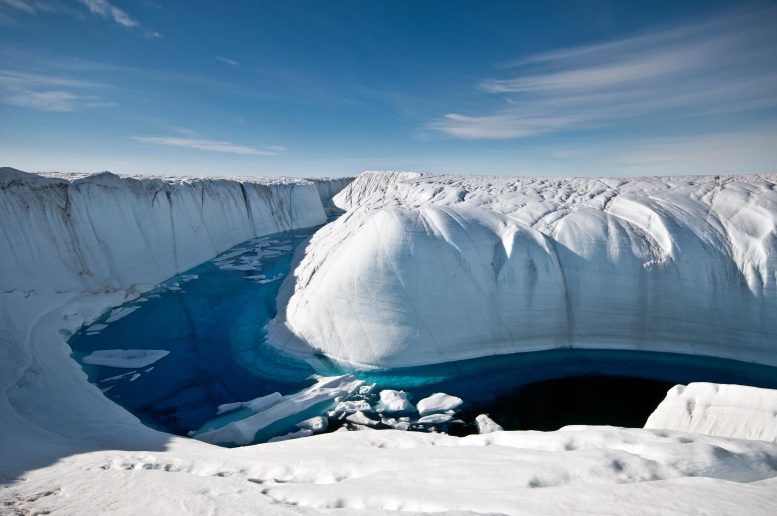
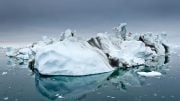
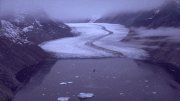
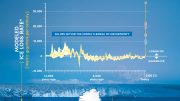
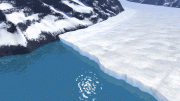
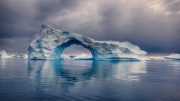
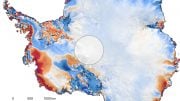
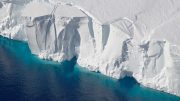
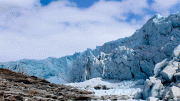
Be the first to comment on "Worst-Case Climate Change Scenario: Greenland and Antarctica Losing Ice 6x Faster Than Expected"